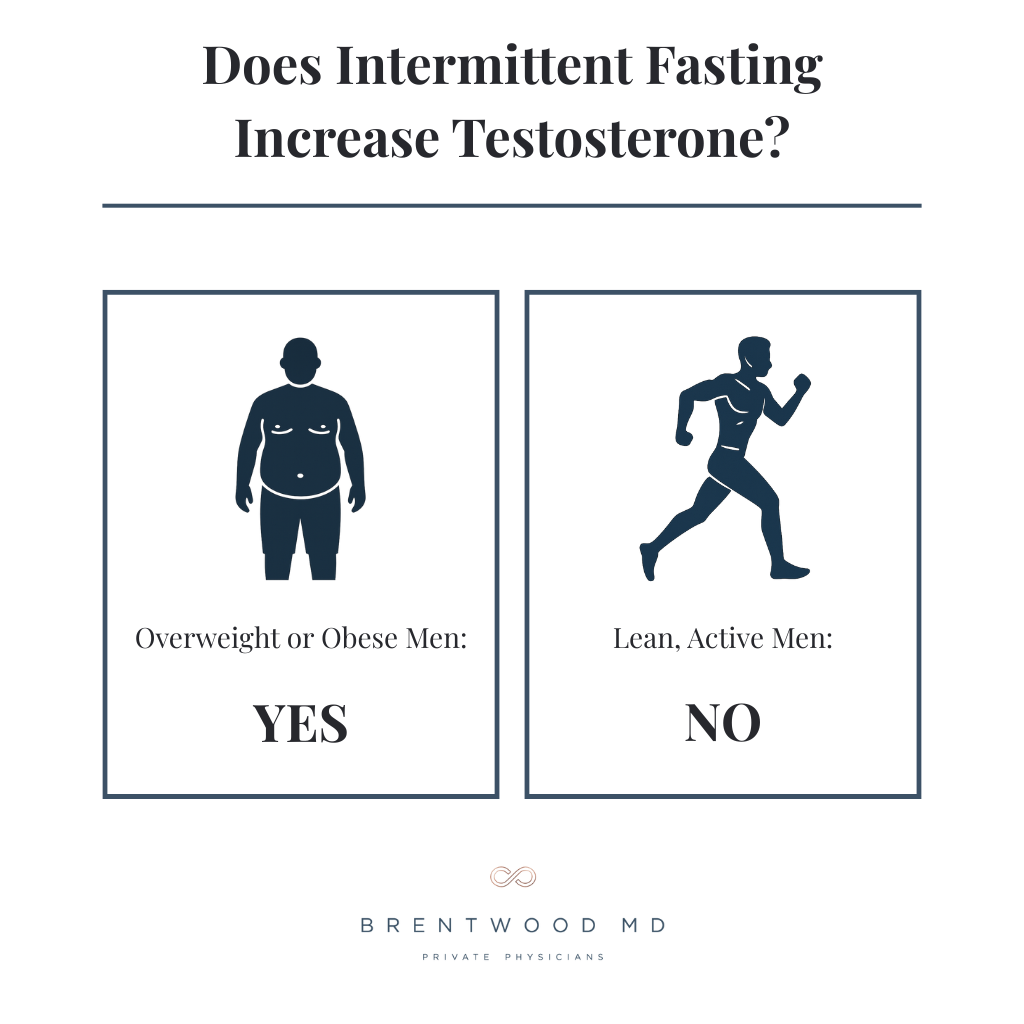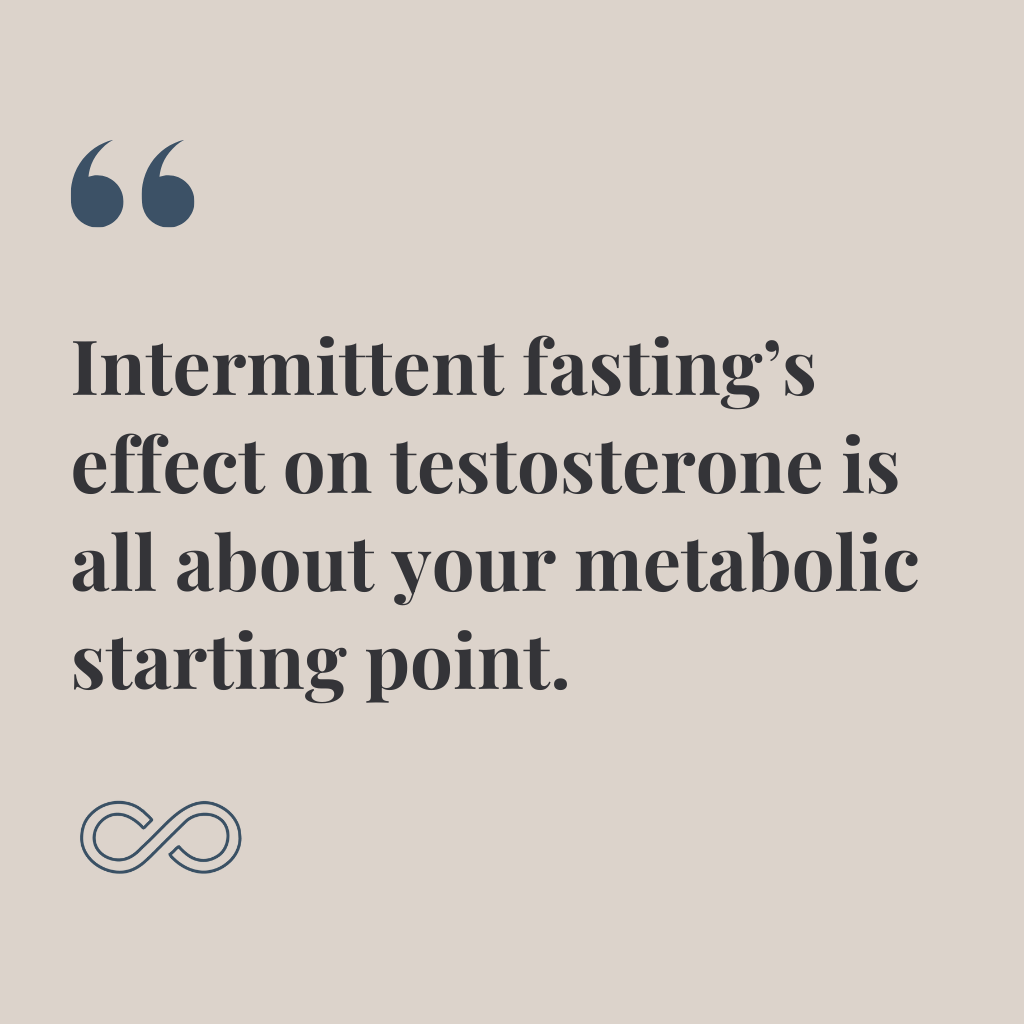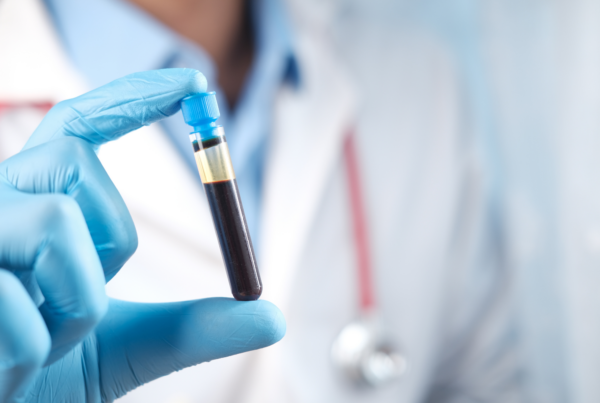If you’re interested in intermittent fasting, you may have questions about how this time-restricted eating method affects your body besides weight loss. Specifically, does fasting increase testosterone?
The answer, like many things in health and medicine, is it depends.
Current research indicates that intermittent fasting doesn’t always increase testosterone, and in some cases, it may actually lower levels. But before you abandon your fasting routine or dismiss it entirely, you need to understand the full picture.
The effects of intermittent fasting on testosterone depend heavily on where you’re starting from metabolically, your body composition, and how you’re implementing your fasting protocol.
Let’s get into the details.
 The Research: When Does Intermittent Fasting Increase Testosterone?
The Research: When Does Intermittent Fasting Increase Testosterone?
When you dig into the research on whether intermittent fasting increases testosterone, you find mixed results telling a complex story.
Most studies examining intermittent fasting in lean, physically active men show a decrease in total and free testosterone levels. It’s important to note, however, that these drops don’t appear to negatively impact muscle mass or strength. Still, the hormonal changes are measurable.
This effect isn’t limited to men. Research also shows testosterone reductions in females who intermittent fast, especially when they consume their daily calories in the morning vs. at night.
Here’s where it gets interesting: In overweight or obese men, intermittent fasting does increase testosterone.
DOWNLOAD OUR FREE EBOOK
Concierge Medicine is the future of healthcare.
Learn more about this refreshing alternative to traditional primary care, and decide if it's right for you.
Key Considerations to decide...
Is Concierge Medicine Right for You?
Research shows that weight loss and reduced fat mass actually help restore healthier testosterone levels in men carrying excess body fat. This improvement likely comes from better testicular function and decreased fat-driven conversion of testosterone into estrogen.
Thus, intermittent fasting is an excellent, low-friction approach for men struggling with weight both to lose fat and increase their testosterone levels.
The Role of Your Metabolic State
A pattern emerges clearly from the research: Intermittent fasting’s effect on testosterone is all about your metabolic starting point.
If you’re a metabolically compromised male — meaning you’re dealing with insulin resistance, excess body fat, or metabolic disease — your testosterone is probably already suppressed for multiple reasons. In this scenario, fasting can be a powerful tool to correct your metabolic state, and as your health improves, your testosterone often follows.
But if you’re already in a stable metabolic place, fasting might be an unnecessary stress on your body. Let me explain.
Fasting is a form of stress on the body. For those struggling with overweight and obesity, it’s usually a beneficial stress. But what about in a body that has plenty of stress already?
When you combine fasting with intense training, inadequate recovery, and/or insufficient nutrition, you create a perfect storm for hormonal disruption.
I’ve seen this pattern repeatedly: Men who push too hard with their diet and training end up watching their testosterone drop to the floor. They’re over-training, under-recovering, going too hardcore on everything, and their body responds by shutting down hormone production.
The solution? Sometimes these men actually need to eat a little more and more often to support their hormonal health. It seems counterintuitive, but your body needs adequate energy and nutrients to maintain optimal hormone production.
The Role of Body Composition
Your current body composition plays a crucial role in how fasting affects your testosterone.
For Men Carrying Excess Fat
Excess body fat — particularly visceral fat around your organs — actively works against healthy testosterone levels. Fat tissue contains an enzyme called aromatase that converts testosterone into estrogen, effectively lowering your available testosterone while raising estrogen levels.
When men with elevated body fat practice intermittent fasting, they often experience improvements in testosterone as they lose fat and reduce this hormonal conversion. Fasting helps them achieve weight loss through better insulin sensitivity and fat metabolism.
We know, too, that obesity impairs testicular function and testosterone production in men. It makes sense, then, that weight loss from intermittent fasting would improve this factor as well.
For Lean, Active Men
Lean men who already maintain healthy body composition may not see testosterone benefits from fasting — and might even experience decreases if they’re not careful about their overall energy balance and recovery.
This doesn’t mean lean men can’t or shouldn’t practice intermittent fasting. The metabolic benefits of time-restricted eating may outweigh the testosterone effects if you’re looking to avoid or reverse insulin resistance. But you need to approach it strategically, ensuring you’re eating enough during your feeding windows and not creating excessive caloric restriction.
Is this a guarantee that you won’t lower your testosterone? Not necessarily. The research on this topic is, unfortunately, sparse. It’s simply the best strategy I can give a man who wants to maintain or increase metabolic fitness while supporting his testosterone production.
Beyond Fasting: The Complete Testosterone Picture
If increasing testosterone is your goal, you need a comprehensive approach that addresses all the factors affecting your hormonal health.
Strength Training: Nature’s Testosterone Signal
Resistance training remains one of the most effective ways to naturally support testosterone production. The mechanical stress you place on muscles during strength training sends signals to your body to increase testosterone production, an effect that’s well-documented in men of all ages.
Sleep: Where Testosterone Gets Made
Most testosterone production occurs during sleep. If you’re consistently getting less than seven hours of quality sleep, no dietary strategy will fully optimize your levels. Sleep quality is non-negotiable for hormonal health.
Stress Management: The Cortisol Connection
Chronic stress elevates cortisol, which directly suppresses testosterone production. Whether through meditation, time in nature, or simply setting better boundaries, managing your stress is essential for maintaining healthy testosterone levels.
Nutrition: Food Quality Matters
When you eat, whether it’s within a time-restricted window or not, focus on real, whole foods that support hormone production. Healthy fats are particularly important — testosterone is made from cholesterol, so severely restricting dietary fats can harm hormone production.
And, yes, time-restricted eating can be beneficial for those struggling with metabolic issues. By increasing insulin sensitivity, reducing excess fat, and limiting testosterone conversion, intermittent fasting can increase testosterone in men.
A Practical Approach to Fasting and Testosterone
If you’re considering intermittent fasting and concerned about testosterone, here’s a balanced approach:
Start by assessing your current state. Are you dealing with excess body fat and metabolic dysfunction? Fasting could be a valuable tool to indirectly support testosterone through improved metabolic health.
Monitor your energy and recovery. If you’re constantly fatigued, struggling with workouts, or losing strength, you may be pushing too hard. Eating more frequently or adding strategic carbs and fats could make a positive difference.
Don’t fast for fasting’s sake. The goal isn’t to see how long you can go without food — it’s to optimize your health. Adjust your fasting window to suit your body. If a 16-hour fasting window leaves you depleted, try 14 hours instead. And I don’t recommend that anyone fast for over 24 hours.
Focus on the bigger picture. Testosterone optimization requires more than just changes to your eating window; attention to sleep, stress management, strength training, and overall nutrition quality will have a much bigger effect than fasting alone.
Does Fasting Increase Testosterone? Final Thoughts
The question “Does fasting increase testosterone?” reveals our tendency to look for simple solutions to complex biological questions.
Intermittent fasting is a powerful tool for metabolic health, but it’s not a testosterone magic bullet. For some men — those with metabolic dysfunction and excess body fat — fasting can be an excellent starting point for improving testosterone levels and overall health.
The key is understanding your body’s unique needs and responding accordingly. If you’re experiencing symptoms of low testosterone — fatigue, decreased muscle mass, low libido, mental fog — I suggest talking with a physician who understands hormone optimization. They can help you develop a comprehensive strategy tailored to your specific situation, which may or may not include fasting.
Your body is constantly communicating with you. The question is whether you’re listening — and whether you have a healthcare partner who can help you interpret what you’re hearing.

Dr. Aaron Wenzel is a concierge physician specializing in the care of fast-moving entrepreneurs, executives, and public figures in the Nashville, TN area. Dr. Wenzel’s diverse life experience and extensive training in family medicine, emergency care, nutrition, and hormone replacement therapies give him the unique platform to provide unmatched care for his patients.









